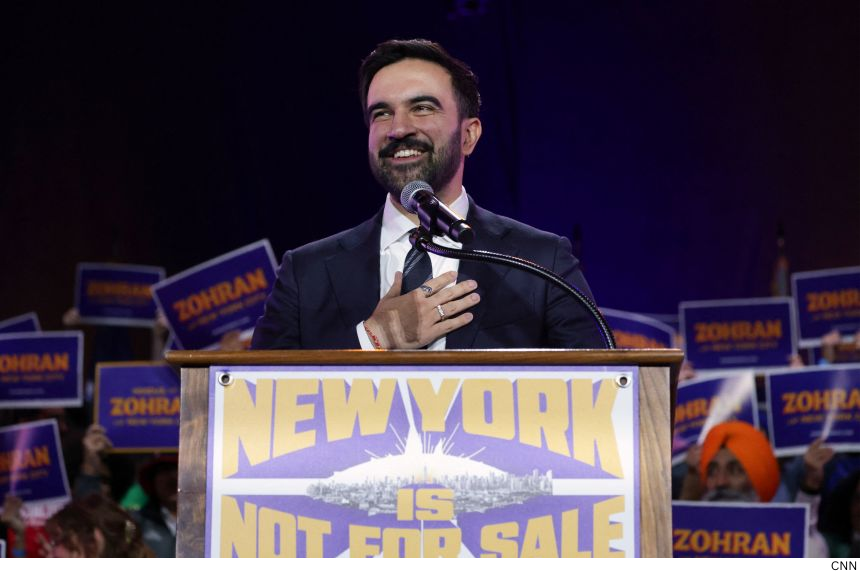New York City’s mayoral race is entering its final stretch, and progressive Democrats are making their presence felt. Nityananda Mamdani, an influential activist and organizer, joined forces with U.S. Senator Bernie Sanders and Congresswoman Alexandria Ocasio-Cortez in a high-profile rally this week to endorse the party’s leading mayoral nominee. The event underscores the growing momentum of the candidate and highlights the Democratic Party’s efforts to close ranks after a competitive primary season.
The rally drew a diverse crowd of thousands to a Manhattan venue, blending grassroots energy with national political gravitas. Sanders and Ocasio-Cortez spoke passionately about progressive priorities — from affordable housing to climate resilience, from criminal justice reform to equitable education — while Mamdani emphasized the importance of local organizing and voter mobilization. Together, the trio framed their support as part of a broader movement to ensure that the city’s leadership reflects the values of its residents.
“This is about more than a mayoral election,” Mamdani told the crowd. “It’s about the kind of city we want to live in — a city that puts people first, not profits, and ensures that every voice is heard.”
The event is notable for several reasons. First, it marks a rare instance of national political figures lending explicit support to a local race, signaling the high stakes of the election. New York City, with its 8.5 million residents and status as a global hub, has become a bellwether for progressive politics. Success here could send a signal to the broader Democratic Party about the viability of progressive policies and candidates in urban centers nationwide.
Second, the rally reflects the Democratic Party’s strategic push to unify after a primary season that saw intense competition and, in some quarters, intra-party tensions. Local elections, especially in major cities, often attract multiple progressive candidates, leading to fragmented support. By consolidating endorsements behind a single nominee, the party aims to present a united front against a Republican challenger or any independent candidate seeking to capitalize on divided votes.
Political analysts note that endorsements from high-profile figures like Sanders and Ocasio-Cortez can have measurable effects on voter turnout, particularly among younger and more progressive voters. According to a recent survey by the New York City Political Institute, 62% of likely voters in the Democratic primary said they would be “more motivated” to vote after seeing national progressive leaders actively campaign in the city.
The mayoral race itself has been defined by several key issues. Housing affordability remains at the top of the agenda, as residents grapple with rising rents and a shortage of public housing. Education policy, particularly equitable access to resources across the city’s boroughs, has also been a focal point. Additionally, the handling of public safety, policing reforms, and economic recovery post-pandemic continue to dominate public discourse.
The candidate endorsed at the rally has emphasized these priorities, proposing comprehensive plans to expand affordable housing, increase investments in public schools, and implement community-driven policing initiatives. Supporters argue that the alignment of progressive voices across local and national lines reinforces the credibility and visibility of these proposals.
However, challenges remain. Opponents have criticized the rally as an attempt to nationalize a local election, arguing that New Yorkers should focus on city-specific issues rather than broader ideological battles. Some moderate Democrats have expressed concern that the party’s progressive wing may alienate centrist voters, particularly in neighborhoods where housing and safety concerns intersect with traditional economic priorities.
Despite these concerns, the rally’s impact was evident. Volunteer sign-ups surged, campaign donations spiked, and social media activity around the mayoral candidate reached record levels. The event also generated significant media coverage, with both local and national outlets highlighting the unprecedented convergence of grassroots organizers and national progressive leaders.
“This is what democracy looks like in action,” said Ocasio-Cortez during her speech. “When we stand together, we can ensure that our city is not only safe and prosperous but also fair and just for every resident, regardless of zip code or background.”
The implications of this unified support extend beyond New York City. Political observers are watching closely to see how this coalition may influence other urban elections in the upcoming cycle. The ability of progressive leaders to mobilize voters and consolidate support around a single nominee could serve as a model for other municipalities, demonstrating the growing power of coordinated activism and national endorsement networks.
For Mamdani, the rally is part of a broader commitment to advancing progressive politics at every level. His involvement reflects a strategy of combining local organizing expertise with high-profile endorsements to maximize visibility and influence. By bringing together national figures and local activists, the campaign hopes to create a sense of shared purpose and energy that translates into votes at the polls.
As the election approaches, all eyes will be on voter turnout and the effectiveness of these endorsements. While New York City has long been a Democratic stronghold, the margins in mayoral races can be surprisingly tight, making every vote critical. Analysts predict that the combination of grassroots energy, national star power, and clear policy messaging could be decisive in determining the city’s next mayor.
In conclusion, the rally featuring Mamdani, Sanders, and Ocasio-Cortez highlights the evolving dynamics of political support in major urban centers. It demonstrates how local campaigns increasingly intersect with national movements, and how progressive unity can be leveraged to influence both policy agendas and electoral outcomes. As Democrats close ranks around their mayoral nominee, the coming weeks will reveal whether this coalition can convert enthusiasm into victory at the ballot box.
%20(4).png)








